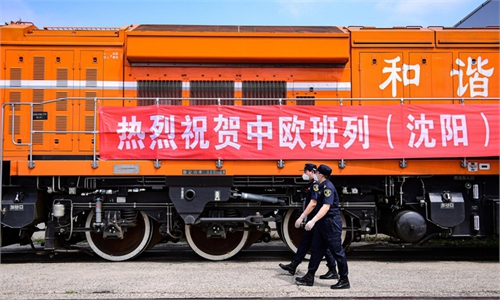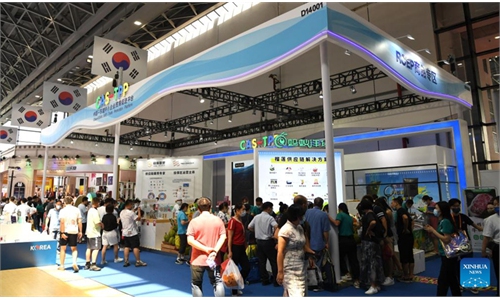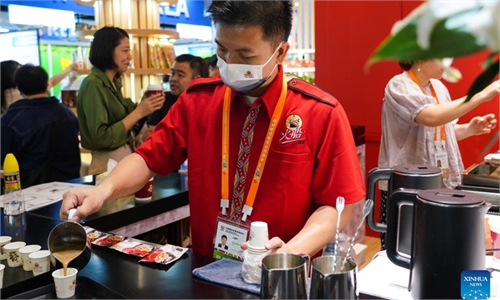Hainan grows into a springboard for RCEP, BRI economies to enter Chinese market
Enterprises eager for brighter future through favorable policies
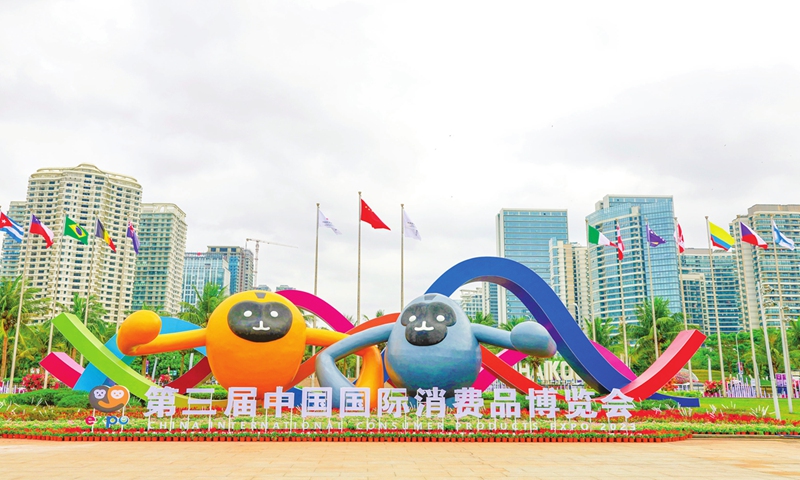
A view outside the China International Consumer Products Expo venue on April 10, 2023 Photo: Li Hao/GT
Not surprisingly, Hainan has become a buzzword among global companies, especially those in attendance at the ongoing China International Consumer Products Expo (CICPE), one of the most important consumption expos in China.
The beautiful Chinese costal province is set to become another free trade port city similar to Hong Kong. In 2025, the province will start island-wide independent customs operations, enabling enterprises to enjoy more convenient policies.
With the anticipated changes, Hainan will become a duty-free shopping paradise with all import duties, VAT, and consumption tax being scrapped. Products processed in Hainan with an added value of over 30 percent are also entitled to duty exemptions when entering the Chinese mainland - a preferential policy which is already being implemented in certain parts of Hainan.
This makes Hainan a big attraction for global companies ranging from large luxury groups to small consumption goods sellers, who have either announced plans to open more stores in Hainan or are thinking of cooperating with local vendors at the CICPE stage.
Among them, companies based in the Association of Southeast Asian Nations (ASEAN), many of which already enjoy benefits from previously enacted favorable policies like the Belt and Road Initiative (BRI) and the Regional Comprehensive Economic Partnership (RCEP), are particularly excited about entering Hainan.
"Hainan lies at the southern end of China. But seen from a larger context, it is at the heart of China's trade network. Therefore, it is central to China's 21st Century Maritime Silk Road," Liang Haiming, dean of the Hainan University Belt and Road Research Institute, told the Global Times on Wednesday.
Liang said that Hainan should develop the mindset of "Hainan plus" to grasp bigger opportunities during the process of building a free trade port. That includes developing services industries along with Japan and South Korea, developing duty-free shopping and manufacturing in partnership with ASEAN economies, and developing finance policies together with Hong Kong.
Hot place for transit trade
At the CICPE, many exhibitors expressed enthusiasm at the mention of preferential policies in Hainan, especially the duty exemption policy for added value of over 30 percent. As a result, some companies are contemplating a supply chain move to the coastal Chinese province to take advantage of the policy.
"To be frank, we are very eager to see the implementation of independent customs operations in Hainan, which I think will generate a lot of business opportunities," said James Ye, Vice Chairman of Thailand food giant CP Group China's Marketing Department on the sidelines of the CICPE. CP Group has established a Xinglong Coffee Chia Tai Industrial Park in partnership with the Wanning municipal government in Hainan.
According to Ye, with the tax exemption policies, the cost of producing coffee in Hainan would be lower. "As we import coffee beans from overseas markets, we can process the coffee beans in our industrial park in Hainan and then sell them both to the mainland and international markets at a lower price," he said.
Besides, the company has also established a trade firm in Hainan. Via the company, the firm hopes to import many materials into Hainan to enjoy the tax benefits.
"Of course, we will need to set up a processing factory to create added values for raw materials in order to enjoy the 30 percent added value tax exemption policy," Ye said. "It takes some time, but the prospects are optimistic."
Singapore-based massage chair brand Osim has a similar plan. In a written reply it sent to the Global Times, Deserine Lim, assistant general manager of branding & strategic marketing (North Asia) at Osim, said that it is planning to "fully utilize" the dividends of RCEP and the Hainan Free Trade Port by "dynamically adjusting industrial and supply chains" and deepening trade cooperation in China. The company opened its first store in Hainan in June 2022.
"With the effective implementation of RCEP and the establishment of the Hainan Free Trade Port, foreign trade enterprises like us have received many favorable conditions for development and operation in China," Lim said.
For smaller-scale companies in countries along the BRI route or RCEP regions, they might lean toward searching for potential business partners in Hainan to process products for them. Some of them are already starting to benefit from the policy change.
For example, the Yuankuangfeibao Supply Chain (Hainan) processes consignments of jade raw stones imported from Myanmar into jewelry in the Haikou's comprehensive bonded zone. The products are approved to be duty exempt goods under the 30 percent added value tax exemption policy.
According to Mao Xiangqun, the company's corporate management director, the efficient implementation of the first processing value-added service has further boosted the company's confidence about expanding production. The firm has leased 2,300 square meters (of factory areas) to increase production lines, and a new 74-ton batch of raw stones have been transported to the factory for processing.
Besides firms in ASEAN economies, companies from other BRI regions are also eyeing Hainan's policy benefits. Victoria Cai, country manager, Asia office at the National Meat Institute of Uruguay, said that beef companies in Uruguay "are very willing" to utilize the favorable policies in Hainan.
"We are studying the policies and searching for business partners in Hainan who have the qualification for importation and processing. We are still communicating with them for the cooperation," she said.
Qiu Wenxu, director of Industry Development Department at the Alliance of Belt and Road Business Schools, said that the transit processing industry will receive "super" dividends from Hainan's favorable tax policies.
According to Qiu, China is the world's largest importer of raw materials and has established international supply chains with about 150 countries and regions. Hainan, with the tax policy, can serve as a key hub between overseas material suppliers- like food exporters- and mainland markets, as the costs of such intermediate processing will be much cheaper than if overseas companies directly export the materials to mainland factories for processing.
"It will bring development momentum in Hainan's industries, which will in turn boost the employment market, optimize Hainan's industrial structure, and prepare the island for development in the finance sector," he said.
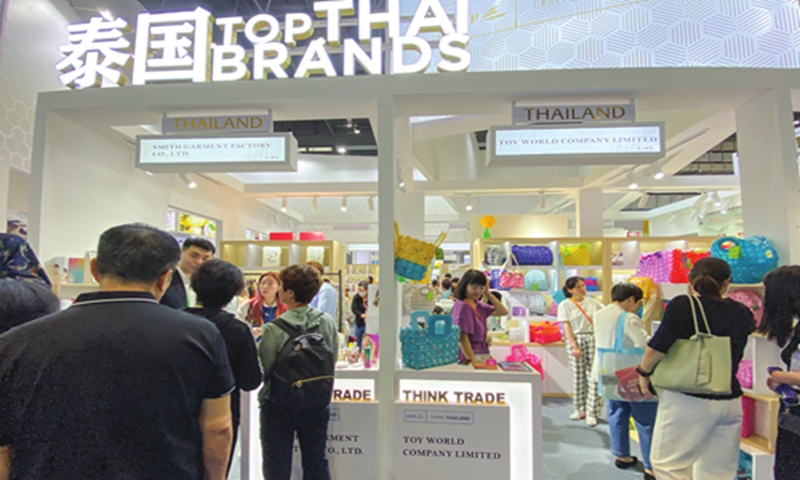
Thai exhibitors display products ranging from clothes to soap at the ongoing CICPE Photo: Xie Jun/GT
Springboard for SMEs
Besides transit processing, many consumption goods sellers and officials told the Global Times that Hainan could also provide an ideal place to "test" their products in the Chinese market before embarking on large-scale sales campaigns, especially for small- to medium-sized companies.
"China is a really huge market, and Hainan, with the duty-free policies and other favorable policies, can be the best springboard for product distribution all over China," Oranuch Wannapinyo, Commercial Consul at the Commercial Section Royal Thai Consulate-General, told the Global Times on the sidelines of the CICPE.
According to her, businesses in Thailand are aware of the Hainan Free Trade policy and are very happy about it, but they can't come to Hainan if there are no or not enough potential buyers.
"So it's time to go both ways. The government provides the incentives and the welcoming policies, and the businesses have to move in the same direction," she said.
The Thai brands' pavilion at the CICPE is both colorful and fragrant. There are a number of exhibitors selling products ranging from perfume and soap to clothes. All of them are filled with customers talking with the sellers.
Saranchana Atipanya, managing director of the Thailand-based Earthbound Co, an exhibitor at the CICPE that sells natural soap, told the Global Times that the company docked cross-border e-commerce platforms and duty-free shops in Hainan during the CICPE to sell products on their platforms.
"China is just coming out of the coronavirus and we feel Chinese consumers' shopping habits have also changed. So we want to test those changes in the Chinese market via cross-border e-commerce platforms and duty-free shops, instead of using general trade which requires a large amount," she said.
Challenges exist
While Hainan is on the way to becoming a hub for duty-free shopping and trade processing, businesses and officials said that there are also challenges to be faced in bringing products into Hainan.
Oranuch Wannapinyo, for example, said that the favorable policies are likely to be most beneficial for large-scale businesses in the beginning, while smaller enterprises may find difficulties in understanding the terms of the cooperative agreement as well as applying for relevant documents, etc.
"To follow the policy is not difficult, but to utilize it is not easy," she said, adding that SMEs might lack the time to apply for the documents and the capital to make the initial investment. "It requires money, time, and also a call from the Chinese government, Chinese businesses, and Thai businesses to work together."
Cai also said that there are challenges for companies to shift supply chains to Hainan. For example, most of Uruguay's beef is exported to China via ports in Tianjin or Shanghai, and Hainan will be a very new market to suppliers.
Some experts suggested that Hainan should make good use of China's technological advantages to tap into business opportunities with the BRI or RCEP countries.
"For example, companies in Hainan could use big data to find out which products from Hainan are the most popular among BRI economies, and bring them in a targeted way to those markets. Likewise, they can import selected BRI products into mainland markets and exploit price differences with its tax benefits," Liang said.
Qiu said that Hainan's processing companies don't have a "cluster base", and the province needs to develop supporting industrial infrastructure to attract outside companies. He suggested that Hainan could pick a few successful examples and give them publicity to attract potential investors that are still waiting to see the effects of such investments.
